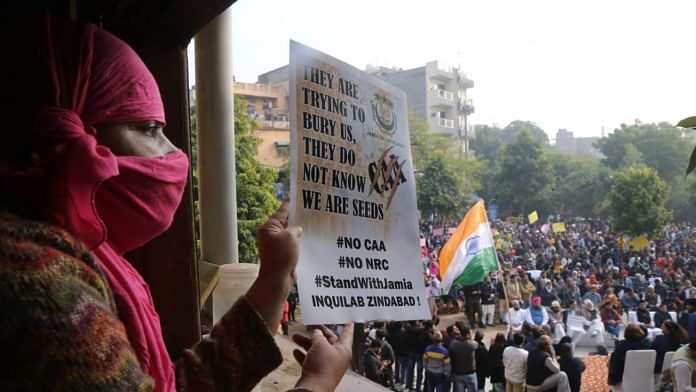In a normal situation, protests against the policies of a government would evoke routine reaction from foreign countries: an advisory for their respective citizens not to visit that country or exercise caution in case they do. But the cancellation of Japanese Prime Minister Shinzo Abe’s visit to Guwahati, Assam, citing massive protests over the Citizenship Amendment Act (CAA) is not a routine reaction.
The India-Japan Act East Forum, besides institutionalising Japan’s involvement in the economic development of India’s northeast and being an important element in the Modi government’s ‘Look East Act East’ policy, is a bilateral attempt to counter China’s Belt and Road Initiative, though neither India nor Japan will openly admit it.
Another foreign dignitary to cancel his scheduled visit to India was the foreign minister of Bangladesh, A.K. Abdul Momen, who cited the CAA protests as one of the reasons. But it is possible that the Sheikh Hasina government did not appreciate New Delhi hyphenating their country with Pakistan on the issue of persecution of minorities.
The US government, UK’s Foreign & Commonwealth Office (FCO) and many other countries issued advisories for tourists travelling to India and/or cancelled official visits.
Domestic issues do not necessarily have serious implications on foreign policy formulations. But the year 2019 witnessed a series of domestic decisions by the Modi government that have had serious implications on the conduct of India’s foreign policy.
Also read: It’s Indira Gandhi’s 1974 in India again, but Modi faces a harsh new reality
Making a statement
The year 2019 began with Indian Air Force (IAF) jets pounding terrorist infrastructures in Balakot in Khyber Pakhtunkhwa in Pakistan Occupied Kashmir (POK) in retaliation to the Pulwama attack on 14 February. New Delhi despatched its diplomatic army to various world capitals and effectively convinced everyone of India’s zero tolerance to cross-border terrorism.
But the larger point of India’s foreign policy and strategic signalling to China was not discussed widely and probably by design, allowed to remain ambiguous. Islamabad’s survival instincts forced it to remain a satellite, first of the US and then China, and allow itself to be used by Beijing to realise its strategic agenda of forging an all-weather road to Indian Ocean through POK. China also used Pakistan’s stand on POK as a ruse to keep that area out of the purview of border talks. Balakot’s message that any military build-up or development detrimental to India’s security in POK will be thwarted by New Delhi seems to have reached the right quarters in Beijing.
Another domestic subject, the dilution of Article 370, a temporary provision in the Constitution, also greatly impacted India’s foreign policy perspective. New Delhi’s diplomatic team fanned out to important destinations and effectively checkmated China-Pakistan partnership against India. The unanimous rejection of China-sponsored resolution in the UN Security Council not only vindicated India’s stand but also resulted in bracketing China with a failed state like Pakistan.
Beijing was quick to make the necessary course correction in its approach to India and even gave an impression that it is brokering peace between two nuclear neighbours. But New Delhi was quick to assure world leaders that as a responsible power, it will not allow any escalation of the dispute beyond a point.
Also read: Allies isolate BJP over National Register of Citizens — 10 of 13 NDA constituents oppose it
New approach is paying off
In the background of the US-China trade war, Beijing prepared for the second summit in Chennai in continuation of Wuhan summit. Last week, Chinese Foreign Minister Wang Yi proposed a framework for resolving border dispute, a departure from the earlier “early harvest” approach of piecemeal resolution as against New Delhi’s suggestion of one time settlement.
India’s position of eminence in the international system has been the result of the deft handling of the foreign policy and the personal equations built over the years. Of late, economic prowess has come to play an equally important role in determining the status of a country in the international power structure.
The protests against the CAA and the National Register of Citizens (NRC) are seriously impacting the economy, which, in turn, will affect India’s relationship with multilateral institutions, foreign institutional investments, and its engagement with the outside world.
These agitations, though strictly domestic affairs, should not be allowed to tarnish India’s image in the outside world and reverse the gains made in 2019.
The author is a member of the National Executive Committee of the BJP and former editor of Organiser. Views are personal.



